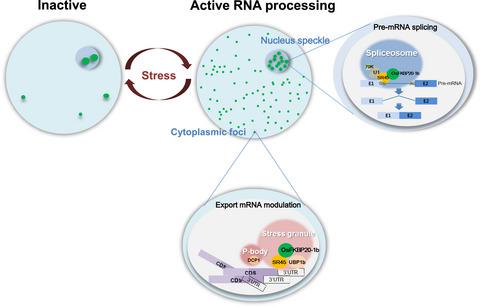Our official English website, www.x-mol.net, welcomes your feedback! (Note: you will need to create a separate account there.)
OsFKBP20-1b interacts with the splicing factor OsSR45 and participates in the environmental stress response at the post-transcriptional level in rice.
The Plant Journal ( IF 7.2 ) Pub Date : 2020-01-10 , DOI: 10.1111/tpj.14682 Hyun J Park 1 , Young N You 1 , Areum Lee 1, 2 , Haemyeong Jung 1, 2 , Seung H Jo 1, 2 , Nuri Oh 3 , Hyun-Soon Kim 1 , Hyo-Jun Lee 1 , Ju-Kon Kim 3, 4 , Youn S Kim 3 , Choonkyun Jung 3, 4 , Hye S Cho 1, 2
The Plant Journal ( IF 7.2 ) Pub Date : 2020-01-10 , DOI: 10.1111/tpj.14682 Hyun J Park 1 , Young N You 1 , Areum Lee 1, 2 , Haemyeong Jung 1, 2 , Seung H Jo 1, 2 , Nuri Oh 3 , Hyun-Soon Kim 1 , Hyo-Jun Lee 1 , Ju-Kon Kim 3, 4 , Youn S Kim 3 , Choonkyun Jung 3, 4 , Hye S Cho 1, 2
Affiliation

|
Sessile plants have evolved distinct mechanisms to respond and adapt to adverse environmental conditions through diverse mechanisms including RNA processing. While the role of RNA processing in the stress response is well understood for Arabidopsis thaliana, limited information is available for rice (Oryza sativa). Here, we show that OsFKBP20-1b, belonging to the immunophilin family, interacts with the splicing factor OsSR45 in both nuclear speckles and cytoplasmic foci, and plays an essential role in post-transcriptional regulation of abiotic stress response. The expression of OsFKBP20-1b was highly upregulated under various abiotic stresses. Moreover genetic analysis revealed that OsFKBP20-1b positively affected transcription and pre-mRNA splicing of stress-responsive genes under abiotic stress conditions. In osfkbp20-1b loss-of-function mutants, the expression of stress-responsive genes was downregulated, while that of their splicing variants was increased. Conversely, in plants overexpressing OsFKBP20-1b, the expression of the same stress-responsive genes was strikingly upregulated under abiotic stress. In vivo experiments demonstrated that OsFKBP20-1b directly maintains protein stability of OsSR45 splicing factor. Furthermore, we found that the plant-specific OsFKBP20-1b gene has uniquely evolved as a paralogue only in some Poaceae species. Together, our findings suggest that OsFKBP20-1b-mediated RNA processing contributes to stress adaptation in rice.
中文翻译:

OsFKBP20-1b与剪接因子OsSR45相互作用,并在转录后水平参与水稻的环境胁迫响应。
无核植物已经通过包括RNA加工在内的多种机制进化出了独特的机制来响应和适应不利的环境条件。尽管对于拟南芥已经很好地了解了RNA加工在应激反应中的作用,但有关水稻(稻(Oryza sativa))的信息有限。在这里,我们显示OsFKBP20-1b,属于亲免蛋白家族,在核斑点和细胞质灶中均与剪接因子OsSR45相互作用,并且在非生物胁迫响应的转录后调控中起重要作用。在各种非生物胁迫下,OsFKBP20-1b的表达上调。此外,遗传分析表明,在非生物胁迫条件下,OsFKBP20-1b可以积极影响胁迫反应基因的转录和mRNA剪接。在osfkbp20-1b功能丧失的突变体中,应激反应基因的表达下调,而其剪接变体的表达增加。相反,在过表达OsFKBP20-1b的植物中,相同的胁迫响应基因的表达在非生物胁迫下显着上调。体内实验表明,OsFKBP20-1b直接保持OsSR45剪接因子的蛋白质稳定性。此外,我们发现仅在某些禾本科物种中,植物特异性OsFKBP20-1b基因已作为旁系同源物独特进化。总之,我们的发现表明OsFKBP20-1b介导的RNA加工有助于水稻适应胁迫。在非生物胁迫下,相同胁迫响应基因的表达显着上调。体内实验表明,OsFKBP20-1b直接保持OsSR45剪接因子的蛋白质稳定性。此外,我们发现仅在某些禾本科物种中,植物特异性OsFKBP20-1b基因已作为旁系同源物独特进化。总之,我们的发现表明OsFKBP20-1b介导的RNA加工有助于水稻适应胁迫。在非生物胁迫下,相同胁迫响应基因的表达显着上调。体内实验表明,OsFKBP20-1b直接保持OsSR45剪接因子的蛋白质稳定性。此外,我们发现仅在某些禾本科物种中,植物特异性OsFKBP20-1b基因已作为旁系同源物独特进化。总之,我们的发现表明OsFKBP20-1b介导的RNA加工有助于水稻适应胁迫。
更新日期:2020-01-10
中文翻译:

OsFKBP20-1b与剪接因子OsSR45相互作用,并在转录后水平参与水稻的环境胁迫响应。
无核植物已经通过包括RNA加工在内的多种机制进化出了独特的机制来响应和适应不利的环境条件。尽管对于拟南芥已经很好地了解了RNA加工在应激反应中的作用,但有关水稻(稻(Oryza sativa))的信息有限。在这里,我们显示OsFKBP20-1b,属于亲免蛋白家族,在核斑点和细胞质灶中均与剪接因子OsSR45相互作用,并且在非生物胁迫响应的转录后调控中起重要作用。在各种非生物胁迫下,OsFKBP20-1b的表达上调。此外,遗传分析表明,在非生物胁迫条件下,OsFKBP20-1b可以积极影响胁迫反应基因的转录和mRNA剪接。在osfkbp20-1b功能丧失的突变体中,应激反应基因的表达下调,而其剪接变体的表达增加。相反,在过表达OsFKBP20-1b的植物中,相同的胁迫响应基因的表达在非生物胁迫下显着上调。体内实验表明,OsFKBP20-1b直接保持OsSR45剪接因子的蛋白质稳定性。此外,我们发现仅在某些禾本科物种中,植物特异性OsFKBP20-1b基因已作为旁系同源物独特进化。总之,我们的发现表明OsFKBP20-1b介导的RNA加工有助于水稻适应胁迫。在非生物胁迫下,相同胁迫响应基因的表达显着上调。体内实验表明,OsFKBP20-1b直接保持OsSR45剪接因子的蛋白质稳定性。此外,我们发现仅在某些禾本科物种中,植物特异性OsFKBP20-1b基因已作为旁系同源物独特进化。总之,我们的发现表明OsFKBP20-1b介导的RNA加工有助于水稻适应胁迫。在非生物胁迫下,相同胁迫响应基因的表达显着上调。体内实验表明,OsFKBP20-1b直接保持OsSR45剪接因子的蛋白质稳定性。此外,我们发现仅在某些禾本科物种中,植物特异性OsFKBP20-1b基因已作为旁系同源物独特进化。总之,我们的发现表明OsFKBP20-1b介导的RNA加工有助于水稻适应胁迫。



























 京公网安备 11010802027423号
京公网安备 11010802027423号